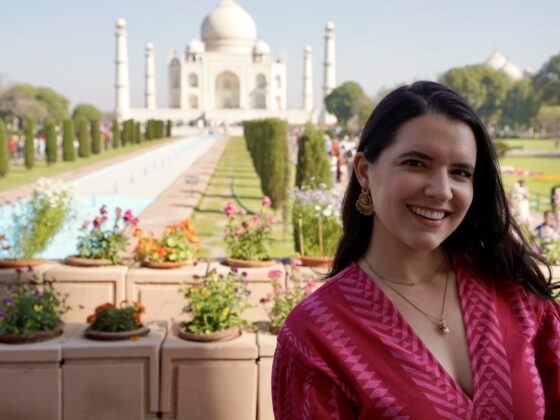 Allie Medack (Class of 2020), originally from Texas, is spending her summer interning with McKinsey & Co. in Washington D.C. She concluded her first year at Darden by participating in the May Darden Worldwide Course to Uganda. Allie explains how the course, which explores entrepreneurship, education and healthcare, tied into her past experiences and future goals, in her own words:
Allie Medack (Class of 2020), originally from Texas, is spending her summer interning with McKinsey & Co. in Washington D.C. She concluded her first year at Darden by participating in the May Darden Worldwide Course to Uganda. Allie explains how the course, which explores entrepreneurship, education and healthcare, tied into her past experiences and future goals, in her own words:
Background
Eight years ago this summer, I moved to the Middle East as part of a State Department Fellowship. The Arab Spring had begun a few months prior and it was my first time traveling outside of the United States as an adult. This experience would undoubtedly have a transformative impact on my life – but even more so than I initially thought. You see, I started the summer with the intention of pursuing a career in international diplomacy. However, as I spent time with Iraqi refugees in Amman, Jordan, I saw the limitations of foreign aid, which could be inconsistent, complicated, and, at times, short-sighted. Instead, I realized what the region really needed was a more inclusive and healthier economy. People needed jobs – a way to provide for their families, feel connected to their communities, and find additional purpose. It was then that I switched my career ambitions to international business, a path that ultimately led me to Darden and to participate in the course to Uganda.
Being in Uganda reignited my passion for working in international business and ultimately, one day, helping countries grow their economies. Hearing from Ugandan entrepreneurs, bankers, government leaders and others shaping the economic future of the country further strengthened my resolve that business is not solely about profit and shareholders, it’s about being a responsible corporate citizen who wields immense power to genuinely help people.
Uganda’s Challenges and Opportunities
Like Jordan many years prior, Uganda has incredibly warm, generous, and hard-working people, as well as natural resources, a distinctive culture, and a significant number of tourist attractions. And, also like Jordan, Uganda is a relatively new country (achieving independence only in 1962) that is still working to bring its citizens into the formal economy.
While Uganda’s GDP per capita has grown from USD 62 in 1960 to USD 606 in 2017, there is clearly more work to do.[1] As Ester from KCB Bank told us, only 27% of the Ugandan population participates in the formal banking sector, and early stage ventures/new companies without a history of revenue struggle to receive funding from formal banks. Even well-established companies, like Red Star Wine, are hesitant to rely on banks, as we heard from the founder.
In addition to financing, there are operational issues that make working in Uganda a challenge. A number of the people we met with lamented on the country’s infrastructure. Poor roads and water supply make distribution for Nile Brewery difficult. Human Resources is another challenge. Employees with proven skillsets are in high demand and can easily be “poached” to join other companies. Additionally, for companies that require technically skilled employees, like engineers, there is a mismatch between what universities teach students and the skills employers need.
All of the aspects we touched on this course – healthcare, banking, education, entrepreneurship – will have an impact on the creation of new and enhanced economic opportunities for people. The thing I found most interesting, though, was the role of Savings and Credit Cooperative Organizations (SACCOs). As several speakers explained to us, SACCOs are mini banking-type institutions that allow people with a common connection (community residency, the same employer, etc.) to pool their resources to create a savings organization from which they can draw loans. The main benefit to SACCOs is that they have extremely low interest rates (typically around 2%, compared to 25-33% with commercial banks). While SACCOs are not government institutions, several laws have been passed to govern their operation to ensure money is not misused.
SACCOs are important because 60% of the Ugandan population lives in rural areas and, as such, participate mostly in the informal sector. For these people – and really anyone – it is hard to get a bank loan without proving the ability to repay. SACCOs enable small communities to develop savings habits and access loans for things like emergencies, school fees, or starting a business.
As we drove from Kampala to Mbarara and then on to Queen Elizabeth National Park, I kept an eye out for SACCOs and was surprised to see them – and usually many of them – in almost every small town that we drove through.
Closing
The Uganda DWC was truly a once-in-a-lifetime opportunity. Not only was it incredible (and incredibly fun) to explore a new country with 30+ classmates, I felt like I learned a lot about entrepreneurship and business development in an emerging market. However, the thing that excites me the most is that this experience reinvigorated my interest in international business and reminded me why I chose this career path in the first place. I’m excited for what the future holds and look forward to hopefully playing some small role in Africa’s development in the future.
[1] Dollar amounts are in current US dollars. https://data.worldbank.org/indicator/NY.GDP.PCAP.CD?locations=UG




